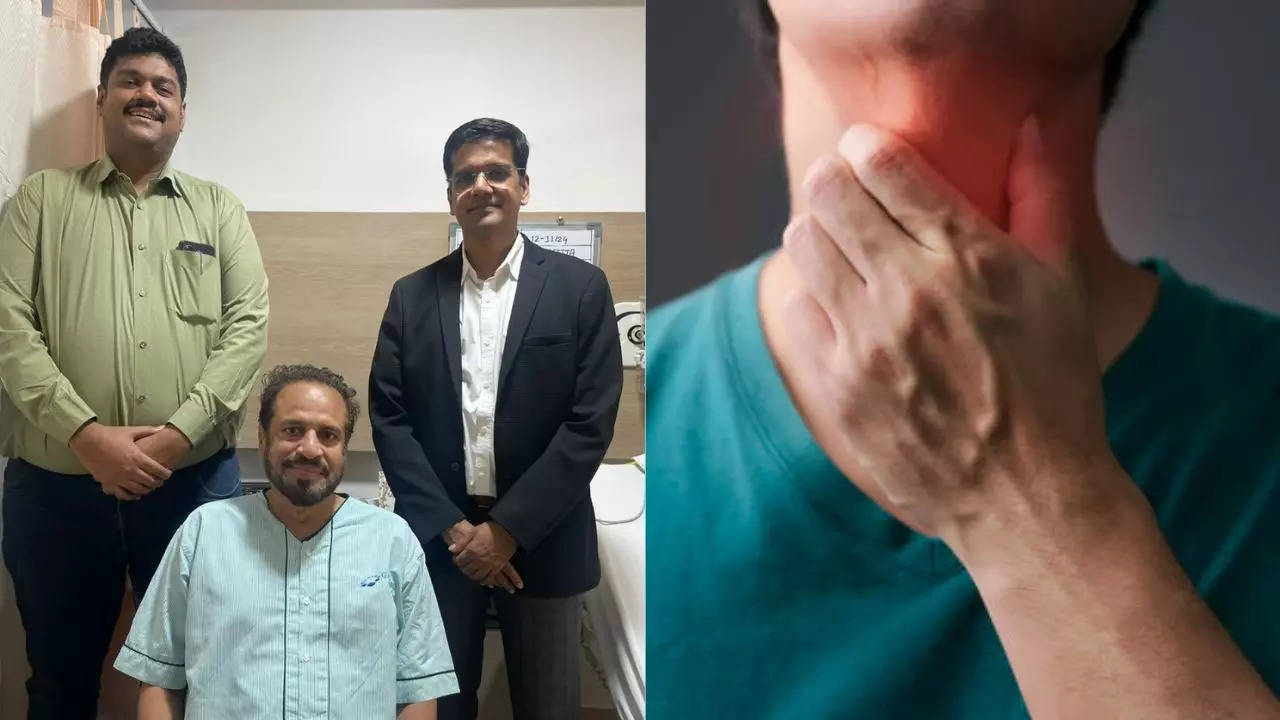-
news
-
Health
‘I can eat my favorite food again’: 61-year-old man’s battle with rare swallowing disorder ends in Mumbai hospital
A 61-year-old Mumbai resident suffering from a rare swallowing disorder, achalasia, found relief after a successful minimally invasive procedure at Gleneagles Hospital. Led by Dr. Megraj Ingle, the treatment restored the patient’s ability to eat normally, marking a significant milestone in the treatment of this one-in-a-million condition.

‘I can eat my favorite food again’: 61-year-old man’s battle with rare swallowing disorder ends in Mumbai hospital (Image credit: Gleneagles Hospital and iStock)
Medical science is progressing day by day and has helped in increasing the lifespan of patients by many years. Recently, in a milestone achievement, a team led by Dr Meghraj Ingale, Director and Senior Consultant, Gastroenterology, has successfully treated a 61-year-old man suffering from a rare and complex disease. swallowing disorderAchalasia. The patient, who was suffering from severe difficulty in swallowing for two years, found relief through an innovative treatment approach. This successful treatment not only brought considerable relief to the patient but also improved his overall health.
Two years ago, Mumbai resident patient Mr. Suhas R. Mungakar experienced hiccups while eating, which he initially dismissed as a problem everyone faces. As time passed, he started having a feeling of his mouth being blocked and it seemed as if food was stuck in his throat. To reduce this, he used to drink water and then after waiting for some time, he tried to eat again. Eventually, these issues appeared to be subsiding for some time. However, he later started experiencing heartburn after meals, especially during the summer months. He started taking antacids and other medicines to manage the discomfort. His wife consulted the family doctor about his ongoing problems with antacids, prompting him to recommend he consult Dr. Megraj Ingle for further evaluation.
Dr Megraj Ingale, director and senior consultant, gastroenterology, said, “On arrival, the patient was having difficulty eating and weight loss as well as chest pain. There was the presence of a rare condition known as achalasia (in which the esophagus is unable to carry food and fluids to the stomach). Endoscopy revealed that he had three or four blockages in his esophagus. There was a narrowing of the esophagus near the stomach. Every time he ate food, the food would get stuck in his throat and then even drinking water did not help as it would also get stuck. He often vomited the food back. Endoscopy revealed a structure resembling a bird’s beak. This is an uncommon condition due to the inability to relax the lower esophageal sphincter. This condition is quite uncommon, affecting only one in ten million. We see about 10-20 a year and no surgery was recommended.”
“When the barium was swallowed, it caused some blockages, and the muscles in his esophagus became larger and were blocking his food and the esophagus narrowed near the stomach,” Dr. Ingle said. This is a procedure in which a tunnel is made between the layers of the esophagus wall through an endoscope and the muscle of the lower esophagus is cut. This is a minimally invasive procedure. Recovery is going fast, the day the patient was discharged he was swallowing food properly.”
“It was frightening for me when two years ago, I had hiccups during meals, which I dismissed without taking any action. It became extremely difficult for me to eat because I was diagnosed with a rare swallowing disorder that was unknown to me. However, I am always grateful to Dr. Megraj Ingale and his team for their timely intervention. Now I can eat my favorite food without any hassle. The patient said.
“Our state-of-the-art equipment, coupled with our expert medical team, ensures that patients receive the most innovative and effective treatments available for such complex conditions,” said Dr. Bipin Chevale, CEO, Gleneagles Hospital, Parel, Mumbai.
Get the latest news live on Times Now with breaking news and top headlines from around the world.


